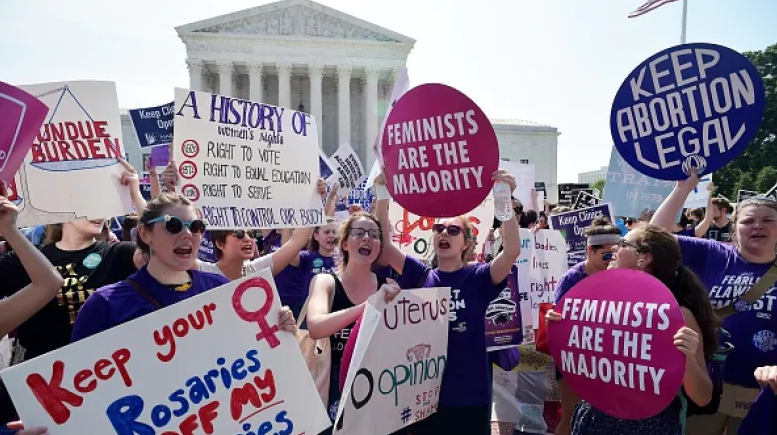The state of Texas just passed one of the most stringent anti-abortion laws in the United States. This is a very sad moment for women’s rights.
The law allows private citizens to sue abortion providers and anyone else who helps a woman obtain an abortion — including those who give a woman a ride to a clinic or provide financial assistance to obtain an abortion. Private citizens who bring these suits don’t need to show any connection to those they are suing.
The law makes no exceptions for cases involving rape or incest.
In addition to being a gross denigration of women’s rights, the law is also a great contributor to income inequality and oppresses the poor.
Let’s be clear, the recent abortion bans will not stop abortions from happening. They will only ensure that some groups — specifically, poor people and people of color — are disproportionately punished when seeking access to abortions.
If a woman who has the economic means to skip work and to travel to another state or another country (Mexico just legalized abortion) wants an abortion, she is going to get an abortion.
On the other hand, a woman who is struggling financially will find it difficult to travel to another stated (or country) to get an abortion.
Women without the means have to navigate insurance policies, time off of work or school, finding money for the procedure, the time and cost of traveling to a faraway clinic, language barriers, childcare, going to court to get a judge’s permission, and more.
If she ends up having the child, because abortion was inaccessible to her, that child will grow unwanted. That child will not have the love and opportunities of a wanted child and thus, perpetuating the cycle of poverty.
The cost of costs of having an unwanted child ranges from
increased rates of crime and welfare participation to reduced levels of high-school completion and labor-force participation.
Women who want an abortion are not yet ready to have a (or another) child or that she does not want to have a child at all. For the most part, women seeking abortion are teenaged, unmarried,
or low-income.
Women who have an unwanted child have a higher incidence of mental health problems, have less stable romantic relationships, experience and higher rates of physical abuse.
In addition, the unwanted child experiences negative physical- and mental health outcomes and are more likely to drop out of high school and to engage in delinquent behavior during their teenage years.
Society will be in a much better place if women are allowed to have abortions with little interference from politicians or religious organizations.
Comments from a reader
What does SB8 mean for women? (The Texas law)
I had an abortion at 27 weeks last month. I live in the state of Oregon, where there are no gestational limits on legal abortion. I honestly couldn’t have told you the gestational limit for abortions in the state of Oregon before then because, while being pro-choice, abortions were for those *other* people, not me. For “irresponsible people.”
On July 30th, 2021, I became intimately aware of the state of Oregon’s gestation limits because at 26 weeks pregnant my daughter was diagnosed with an extremely rare chromosomal deletion and was severely growth restricted. At 26 weeks, Lyla was the size of a 22-week old baby. It was very unlikely she’d make it to delivery or continue to grow to viability. I came home and screamed in my husband’s arms for hours, begging for my baby. Wailing that she was right there and I couldn’t save her.
What could have happened next is I could have been forced to buy two plane tickets to Colorado (the nearest state that has no gestational limits), try to find a hotel and a hospital that would perform the procedure (most likely without my husband), and do all of this in the midst of the darkest time of my life. Where I was literally paralyzed with soul-crushing grief, sadness, and terror.
The total bill to come home without my living baby was $25,000. Luckily it was covered by insurance – it is most often not, especially if you have to leave the state.
Instead, I was treated with kindness. My maternal-fetal medicine doctor spent an hour on the phone with me. My genetic counselor researched every option. I had my baby at the hospital I had all of my perinatal care with a surgeon who told me I was a good mother faced with a devastating choice. The nurses were trauma-informed and had experiences with other people in my position.
This, right here, is the face of abortion. I ended my much-wanted pregnancy to spare my child pain. It was a deeply personal choice, and that choice was my husband and I’s to make – not a white, male lawmaker. It’s tempting to think nothing like this can happen to you, your wife, your daughter, your sister, your friends (or any other childbearing human). I would never wish this on my worst enemy.
I share because there are real-world consequences for banning abortion at ANY gestational age, and I stand with women and support any business actively opposing SB8. No one knows what they would do until they stand in my shoes.
Nov 10, 2024: 7. Lawmakers in Iraq want to lower the age of consent from 18 years old to 9 years old. The proposed legal change also deprives women of rights to divorce, child custody, and inheritance.
